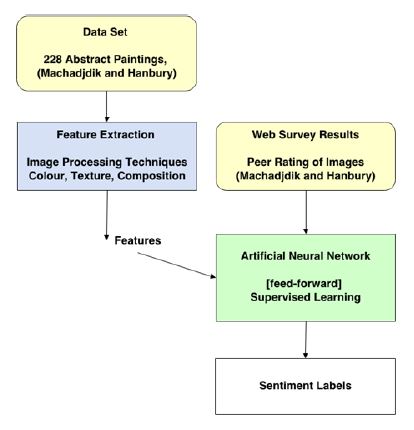ANN emotion Classifier
Affective Classification of Abstract paintings Using Artificial neural Networks
“Can we train an Artifical Neural Network to mimic the human ability to perceive a primary emotion conveyed by an abstract painting?”
Project Overview
While images can be characterized by their content as perceived by a human observer, they can also be characterized by the emotion they portray or project on an audience. In this project, we explored the use of an Artificial Neural Network (ANN) for affective image classification. We developed and investigated different variations of ANNs to identify a dominant emotion (amusement, anger, awe, content, disgust, excitement, fear, and sadness) in abstract works of art, as seen above, based on low-level image features (colour, texture, composition).
Approach
Algorithm flowchart of proposed solution.
Using a collection of 228 Abstract paintings, we used image processing algorithms to extract low-level image features for colour, texture and composition. We also created a web survey and asked our peers to specify what they felt was the dominant emotion conveyed by each painting. We then experimented with different configurations for ANNs, trained them, and tested their performance.
Results & Discussion
We compared LMFF to RBF and found that LMFF performs better in our usecase. Interestingly both topologies made relatively few errors when classifying abstract paintings as conveying amusement and fear. This suggested to us that humans may be able to more easily identify and agree upon paintings featuring these emotions. Alternatively, it could suggest that these emotions were more closely linked to our choice of low-level image processing features. More details can be seen in the report.
Course
Completed as a final project for the SYDE 522: Machine Learning course, in the Systems Design Engineering Program at the University of Waterloo. Done in collaboration with Audrey Chung.
Themes
Machine Learning, Emotion Classification, Artificial Neural Networks (ANN)
Skills & TEChnologies
Image Processing and Artificial Neural Nets using MATLAB, User Surveys
MY ROLE
We contributed equally towards data collection, creating the survey, coding and applying algorithms to calculate low-level image features, as well as coding, training and testing an ANN to perform the emotion classification of the paintings.

